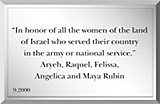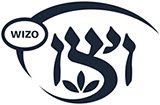
Israel Policy Forum, general support
Established in 1993, the Israel Policy Forum’s (IPF) mission is to support active American efforts to achieve stability and peace in the Middle East in order to strengthen Israeli security and further US foreign policy interests in the region. Since that time, IPF has consistently delivered a solid message of support for an active American role in resolving the Middle East conflict. It is an independent, nonpartisan organization.
“I want to congratulate you for your foresight in establishing the Israel Policy Forum,” former Vice President Al Gore said at an IPF tribute dinner in 1999. Referring to the time just after the Oslo Accords had been signed—when it seemed the peace process was purposefully moving forward—he said, “You understood in this organization that winds can blow in both directions, that things can change. And so you founded a new organization committed to the cause of peace in the Middle East and organized to support it intelligently and actively.”
In its effort to generate support for the peace process, IPF involves leaders from a variety of professions, including those associated with business, politics, arts and entertainment, academics, and philanthropy. IPF programs have included meetings between Jewish leaders and Washington policy makers to promote the peace process and satellite teleconferences between Israeli and American leaders. IPF also regularly publishes and disseminates assessments and reports analyzing the situation in the Middle East and conducts regular surveys of American and American-Jewish opinion on the peace process.
Targum Shlishi has been a full supporter of Israel and of ending terrorism in the Middle East. To this end, Targum Shlishi has supported IPF with regular donations over the course of several years. However, in 2001 as a result of the ongoing violence and a difference in opinion with IPF’s policies on the uprising, the foundation reduced its funding to IPF by 75 percent to reflect the change in Targum Shlishi’s position on the peace process. Recent events merit a dramatic change in approach to the problems in the Middle East, a change the foundation does not see reflected in the IPF, although it remains a vital counter to some of the more right wing organizations. In 2002, Targum Shlishi elected not to provide any funding to IPF.

Israel Policy Forum, Fact-Finding Mission to Israel
During the waning days of Prime Minister Benjamin Netanyahu’s administration, and shortly before Ehud Barak’s election as prime minister, the Israel Policy Forum (IPF) organized a fact-finding mission to Israel to explore ways to strengthen American support of conflict resolution in the Middle East. Targum Shlishi’s Aryeh Rubin participated in the mission. The group’s efforts focused on gaining information that would strengthen IPF’s education and advocacy efforts and on building relationships between IPF leadership and Mr. Barak’s advisors. The group met extensively with senior Israeli officials, including candidates Barak and Benny Begin. It also held talks with Dan Meridor, Chemi Shalev, the faculty of the Jaffee Center for Strategic Studies, and others to discuss their views on issues regarding Israel’s security, Jerusalem, and the Palestinians.

Ohel Dvorah Synagogue, renovation, Rechovot, Israel
The Ohel Dvorah Synagogue in Rechovot, Israel has a vibrant and welcoming atmosphere. It is home to a unique congregation, consisting of Jews of both Sephardic (Spanish and Mediterranean) and Ashkenazi (Eastern European) descent. The building, originally constructed in the 1950s, was very much in need of repair, nowhere more so than in the women’s section (in Orthodox congregations, men and women are segregated). The women’s section had no air conditioning, temporary walls, and poor acoustics. Targum Shlishi provided partial funding to renovate and refurbish the section. The foundation dedicated this effort to all Israeli women who served in the army or national service. This support has meant a great deal to the community; since the repairs were completed, the number of women attending Shabbat services has doubled.

Israel Policy Forum, Peace and Jewish Tradition Sessions, New York City
Targum Shlishi provided the seed funding for a series of 10 class sessions entitled “Peace and Jewish Tradition,” organized by the Israel Policy Forum (IPF). The
classes, taught by rabbis, each explored a distinct topic. For example, Rabbis Adam Mintz and Michael Paley led a discussion with Congressman Jerrold Nadler about what the Jewish tradition teaches about negotiating peace.
“The sessions were enlightening, inspiring, and motivating,” said Debra Wasserman, executive director of the IPF. The program was so successful that the Reform Movement has incorporated some of the ideas, and the IPF has decided to hold another series of similar sessions.

Yad Eliezer, food for low-income families, Israel
Yad Eliezer is a Jerusalem-based organization that provides food for approximately 2,500 low-income families in several Israeli cities. Much of the food is donated and prepared by volunteers; other sources include surplus produce and slightly damaged products donated by industry and the government, as well as food purchased at substantial discounts. In 2001, Targum Shlishi provided funding that made it possible for large jars of honey to be added to 1,000 packages distributed to families for Rosh Hashanah (the Jewish New Year). According to tradition, eating apples dipped in honey at Rosh Hashanah assures a sweet year to come. In 2002 Targum Shlishi helped to fund the purchase of 36,000 kilos of first-quality potatoes that were distributed in 20 kilo bags to 1,800 families.
Betovat Rachel, free-loan fund, Israel
Established by Targum Shlishi in conjunction with other organizations, Betovat Rachel offers interest-free installment loans to individuals experiencing temporary financial difficulties. A portion of the fund is earmarked for the Breslover Hasidim in the Israeli city of Safed. In its first year, the fund extended approximately 40 loans.

Women’s International Zionist Organization (WIZO), Florida branch
Founded in 1920, WIZO is a well-established international organization dedicated to serving the needs of women in Israel and promoting Jewish education in Israel and throughout the world. The organization is large, with more than 50 federations and 250,000 volunteer members throughout the world. It has established and runs a host of programs in Israel, where it has worked steadily to advance the status of women. WIZO provides services including day care centers, schools, youth villages, legal advice bureaus, shelters for battered women, centers for the prevention and treatment of violence in the family, emergency hot lines for battered women, and services for single parent families. Targum Shlishi’s funding was directed to WIZO’s violence prevention programs.
Tank Corps Project, Israel Defense Forces, Israel
Targum Shlishi “adopted” a unit of the Israeli army and provided funds for the purchase of noncombat items that are not covered by the Israel Defense Forces expense allocations, but which help raise soldiers’ morale. The foundation’s adopted unit is Company Lamed, Battalion 71, Brigade 188. This tank unit is involved in antiterrorist activities. Among the items to be purchased through Targum Shlishi’s funding are warm winter jackets, stereos, and computer-related equipment. In addition to supporting the Tank Corps project, Targum Shlishi has provided general support to the Israel Defense Forces at various times during the past several years.

One Voice: Jewish Women for Israel, JOFA, New York City
For description, see Women’s Issues 1992-2002.

